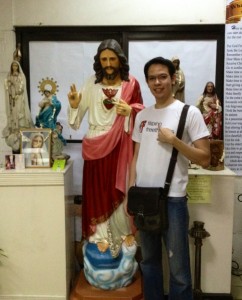“Let all with something to say be free to express themselves. The true and sound will survive. The false and unsound will be vanquished. Government should keep out of the battle and not weigh the odds in favor of one side or the other.” — John Milton
How much would it cost to advertise in government? The question is rhetorical, of course, because such a thing is not allowed, but just imagine for a moment that it were. What publicity a brand could gain from a single event!

Just recently, most major TV and radio stations covered the Corona trial. Live feeds were streamed online, and commentary was all over Facebook and Twitter. Imagine the Senate walls filled with posters of anti-aging and skin-whitening products. Imagine Coke cans or Gatorade bottles on top of every senator-judge’s table. Imagine them wearing race car driver uniforms displaying the logos of their sponsors. Or the prosecution and defense wearing jerseys endorsing competing products. Court-side announcers saying things like, “Senator Sotto’s speech was brought to you by Eat Bulaga,” or, “Senator Bong Revilla’s decision was brought to you by Panday–only in theaters.”
This is absurd in many ways, but I want to focus on the most important one: These public spaces belong to every Filipino, these public servants work for every Filipino, and as national representatives, they represent every Filipino. Senator Enrile endorsing Ray-Ban sunglasses doesn’t mean he alone endorses it. It means 1/24 of the Philippines endorses Ray-Ban. And what does a Coke can on top of every table represent? It means the Philippines endorses Coke.
What about the citizens who prefer Pepsi? Or Dr. Pepper? Or those who don’t care for carbonated drinks at all? Too bad for them. And too bad for the companies who sell those marginalized products. With their competition getting such prime advertising, they’d more likely be outsold in the market.
All they could do is ask for this unfair practice of government advertising to end. And who would they ask? The same representatives who are already endorsing the products of — and receiving money from — the dominant companies.
This is obviously wrong. For companies to compete fairly, and for consumers to get the most of a fair market, the government has to stay out of it. It’s unfair to make laws in favor of one company — or against another — but so is mere advertising that shows preference for one over the other. Such is the power of advertising, and companies would pay millions — if they could — to get public servants to publicize their product.
The government doesn’t have to make laws that promote a product to give a company an unfair advantage over its competition. Just endorsing products, however indirectly, would do the job. Pretty simple, right?

So why is this concept lost on so many when it is applied to religions? How is it fair for statues of Jesus and Mary to be displayed instead of statues of Shiva, Vishnu, or any of the millions of Hindu gods? What makes it fair for Christian prayers to be said and Christian ceremonies to be performed instead of Wiccan chants and Pagan rituals? What makes commercial advertising different from religious advertising?
Religion is a business, and every church is competing for the business of believers. When there is no competition for business, a monopoly exists. Such a religious monopoly is called a theocracy, and the last time the Catholic Church had it they used a viral marketing strategy called the “Inquisition & Crusades.” It was a killer campaign.
The Catholic Church threatened, tortured, and murdered those who wouldn’t buy their products. They destroyed fakes by burning books–and their authors. (It’s interesting to note that the Bible was one of those books.) And they waged wars against companies who threatened to bring their exports into their monopolized market.
It wasn’t just bad for the competition. The customers, aside from being under constant surveillance and afraid for their lives, didn’t have any say about the product they were forced to buy. They couldn’t complain. The customer was always wrong.
Those who had no problem with the product (Catholicism) couldn’t be called informed buyers because they often had nothing else to choose from. And even if they did, it was forbidden to choose. Those who did were branded heretics (from the Greek hairetikos meaning able to choose) and were given a preview of the Hell they were condemned to.
Today, the Catholic Church can no longer use such methods to maintain their monopoly. But lucky for them, they don’t have to. For centuries, all that threatening, torturing, and killing to sell their products gained momentum.
Even without so much Church intervention, parents, teachers, and other authority figures perpetuated the hard selling to their children, and their children would sell to their children’s children, and so on, generation after generation. We call that shared upbringing culture, and we call that momentum tradition.
When Rep. Mong Palatino proposed a bill promoting religious freedom in government offices, all he did was ban religious advertising to ensure that religious businesses competed on a level playing field. When religions compete on a level playing field and citizens are truly free to choose which religious products to purchase (or not) — this free market condition is called secularism.
Critics cried that he was attacking Filipino culture and tradition, severing a link to some glorious past worth perpetuating. But I don’t think they want to go back to those good old days of religious monopoly. There’s a reason it’s called the Dark Ages.
___
Thanks to Jeiel for the CJ trial image.


For me, it is not a valid functions of the government to be in business of advertising that competes with the private sectors. The government national television was created to advertise all its activities and programs only. Because of limited funding in the operation of a television station, the government resorted to advertising for additional funding or they invite marketable products to advertise with them for a fee. In fairness to religion (the established Church), they do not use coercion or even pay a fee to advertise. It is some sort of a voluntary actions of its member that those who are so happened to be in the government offices. And many of them (government people) are members of the established Church. Given that facts, there is an implied actions or thinking of the majority to express their beliefs without giving some consideration to the minority (the opposite of their beliefs). It becomes natural for the majority (members of the Church) to do that without any objection from the minority (the opposite of their beliefs). It becomes the co-mingling of the culture of religion and government. We have to rethink on how to defend secularism not in the form of fighting or combating the established religion. The only way I could find is to go the concept of individual rights. We have to understand and learned what is individual rights in a proper sense. What I know is that there is no such concept of individual rights in any religion. If they happened to have that concept then that would be a twisted kind. It is the concept of individual rights that separated the State from the Church during the founding of the USA. and expressed in their constitution.
Days ago, I made this comic in response of the withdrawal of Palatino's bill. http://butthurtphilippines.tumblr.com/post/258318…
If they're gonna keep religion in public office then ALL religions should be welcomed as well!
I recently saw your interview with Boy Abunda and I have to commend on how brave you were, tackling an issue/issues and going against what may be considered to be the most powerful factor in filipino culture, that one singular factor – catholicism – which has pretty much defined and sadly, over the years defiled us as a people. worth mentioning to your followers is Bill Maher's ( himself an avowed atheist) documentary RELIGOLOUS to watch it. please continue to be brave.